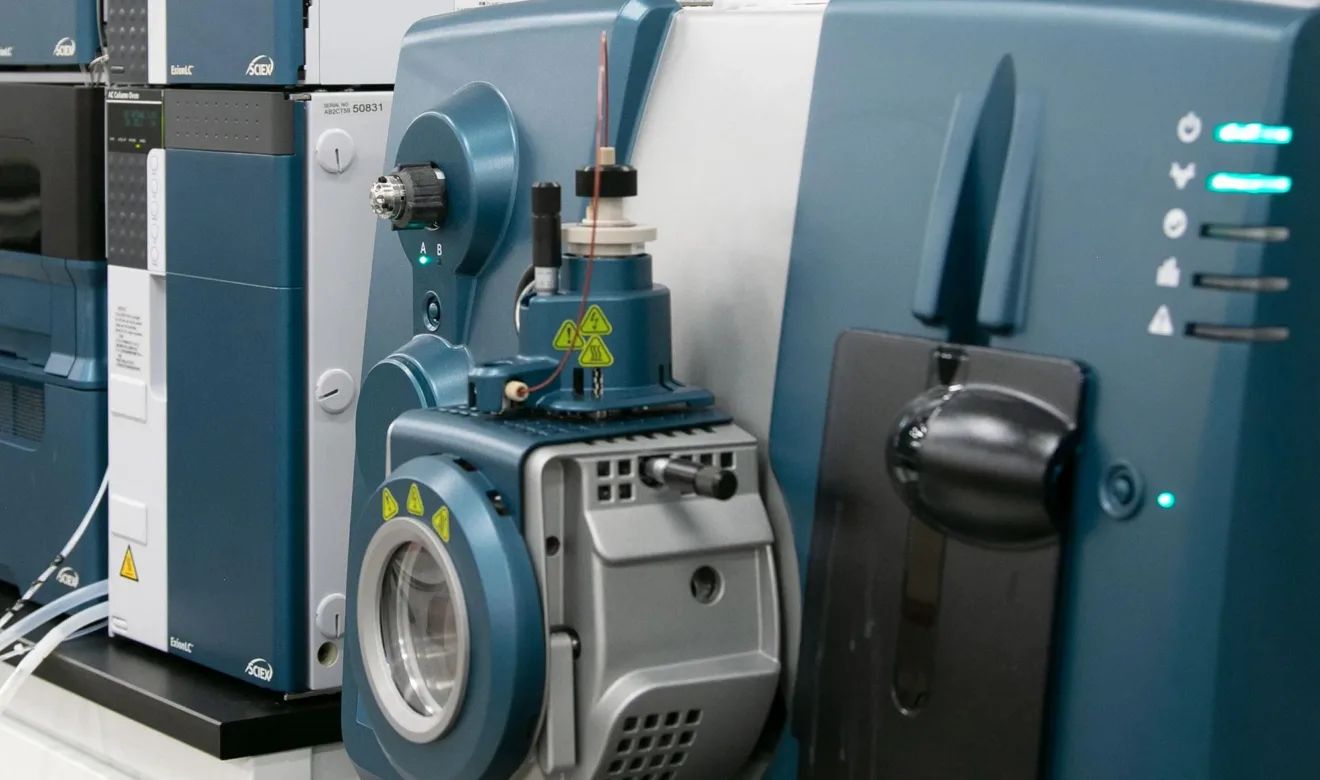
LCMS Analysis & Testing
KCAS Bio has a team of experts specializing in Liquid Chromatography Mass Spectrometry (LC-MS/MS). With deep knowledge and breadth of experience, we quickly adapt experimental approaches when issues arise.

Why LC-MS/MS?
Liquid Chromatography with tandem mass spectrometry (LC-MS/MS) is a powerful analytical technique that combines the separating power of liquid chromatography with the highly sensitive and selective mass analysis capability of triple quadrupole mass spectrometry. The strength of this combination provides the ability to accurately quantify compounds based on the unique mass/charge (m/z) transitions of each compound of interest from biological extracts.

Supporting our clients through scientific and regulatory challenges
KCAS Bio is positioned to help keep the pace of development programs on track, meeting regulatory requirements and supporting the journey through the constant challenges that arise as development progresses. LC-MS has long been considered the gold standard for quantitative small molecule PK assays. These assays are typically based on single extraction followed by reversed phase chromatography before elution into the mass spectrometer. LC-MS has continually been expanding to include more selective extraction and chromatographic approaches and more complex setups. Although reversed-phase chromatography is still predominant, hydrophilic interaction liquid chromatography (HILIC) is becoming more widely used for polar or hydrophilic molecules. Peptide and protein analysis, either directly or as a result of digestion, is also a growing field and often requires additional chromatographic complexity such as smaller scale (microflow or nanoflow with capillary columns) as well as multidimensional (2D, trapping) approaches. Today LC-MS is a core technology for any Bioanalytical or Analytical lab.
EXPERTISE BY MOLECULE TYPE
• Small drug-like molecules
• Amino acids and peptides
• Acylated peptides
• Biomarkers (low and high molecular weight)
• Organometallics
• Biotherapeutics
• Monoclonal antibodies
• Proteins
• Fusion proteins
• Oligonucleotides
LC-MS/MS – biologics capabilities
KCAS Bio has been working with biologics since they showed up in innovators’ pipelines. As techniques have advanced, KCAS Bio has invested heavily in expertise and technology to become one of the most capable CROs providing cutting edge approaches to method development and validation of LC-MS/MS analytical methods for biologics.
The bioanalytical lab’s experience applying LC-MS/MS and affinity capture LC-MS/MS methodologies to biologics includes:
- Intact peptides, atypical peptides, monoclonal antibodies, Fab fragments and fusion products
- Antibody-drug conjugate (ADC) assays (preclinical and clinical):
- Total antibody
- Antibody-conjugated toxin (cleavable and non-cleavable linkers)
- Conjugated antibody
- Unconjugated toxin (auristatins, calicheamicins, pyrrolobenzodiazepines (PBD), tubulysins, maytansinoids)
- Semi-quantitative analysis of intact proteins (>10 kDa)
- DAR characterization of antibody-drug conjugates (ADCs) using high-resolution mass spectrometry (HRMS)
Areas of technical development expertise
Areas of technical development expertise include:
- Method development and validation (LC-MS/MS, UPLC)
- Method transfer and optimization (LC-MS/MS, UPLC)
- A wide range of sample preparation methods from simple protein precipitation to complex affinity capture enrichment techniques
- Development and validation of LC-MS/MS assays using surrogate peptides produced by proteolytic digestion for quantification
- Multidimensional chromatography for the quantitation of biotherapeutics, peptides, proteins and biomarkers
- Preclinical and clinical matrices (biological fluids and tissues)
- Analysis of chiral compounds
- Support for discovery through pre-clinical TK/PK studies
- High throughput analysis to support discovery TK/PK/PD studies
- Analytical support for clinical trials
- Pharmacokinetic (PK) studies
- Bioequivalence studies
- Targeted metabolite ID
Something to keep in mind
KCAS Bio has developed assays for all modalities utilizing the LC-MS platform. We currently have nearly 40 LC-MS systems at our main Olathe site. These systems can be used for non-GLP or GLP method development, validation and sample analysis.
KCAS Bio has over 45 years of expertise in developing small molecule quantitative LC-MS assays. Specifically, we have developed and validated PK assays for New Chemical Entities (NCEs), oligonucleotides, and therapeutic peptides including GLP-1 analogs and other acylated peptides. The team has considerable experience working with many classes of small molecule biomarkers including lipids, amino acids, oxylipins, nicotinamide adenine dinucleotide (NAD), adenosine triphosphate (ATP) and steroids.
KCAS Bio also has significant expertise in large molecule LC-MS most notably using Hybrid LC-MS to support therapeutic biologics, ADCs, mAbs, bi-specifics, fusion proteins, as well as protein biomarkers. Our scientists have over 25 years in the hybrid LC-MS field and can tackle some of the most challenging projects where other CROs have failed. Hybrid LC-MS is supported in conjunction with on-line and off-line affinity capture technology utilizing either multidimensional chromatography and various pumps and valve configurations as well as utilization of automation platforms such as the Kingfisher Flex or Integra Viaflow.
KCAS Bio is equipped with the latest LC-MS/MS technology to support the most demanding bioanalytical studies. Our suite includes the Sciex 7500+ for ultra-sensitive quantification, the Thermo Fisher Orbitrap Exploris 240 for high-resolution accurate mass analysis, and Shimadzu Nexera UPLC systems to ensure robust, reproducible separations. We can choose which instrument platform to utilize based on the needed sensitivity, throughput and selectivity of the assay. This advanced instrumentation allows us to generate high-quality data with precision and confidence across a wide range of therapeutic applications
Tell us how we can help with your project
We've earned our reputation for delivering reliable, error-free data. We understand the importance of speed, flexibility, and consistency and only make promises we can keep.
KCAS Bio's LC-MS/MS instrumentation
KCAS Bio is uniquely qualified to provide bioanalysis using LC-MS/MS. Our expertise lies in bioanalytical trace-level quantification by tandem mass spectrometry of both small and large molecules in biological matrices (fluids and tissues) to support drug development. Our expertise in supporting human and animal health, combined with consulting services, is our strength. Additionally, our team at KCAS Bio comprises leading experts who were early pioneers in the field of hybrid LC-MS/MS, with over 20 years of experience in developing assays for large molecules for both biomarkers and biotherapeutics.
We perform all forms of extraction and sample cleanup (protein precipitation, liquid-liquid extraction, solid-phase extraction, supported liquid extraction, bead-based immunoaffinity capture, tandem column chromatography) and rely on our deep understanding of various techniques to navigate around potential problems that may occur during extraction, derivatization or digestion, the chromatographic separation, or the performance of the mass spectrometer. With a wealth of expertise in both ligand binding assays and LC-MS/MS, we are the partner to help you choose the best technology.
At KCAS Bio, we combine technical expertise and capabilities with state-of-the-art operational infrastructure so that we can scale and adapt quickly to the needs of your project.
'Quality by design' drives every aspect of our work. Our facilities, security and IT infrastructure ensure your samples remain protected at all times, while cultivating excellence and innovation among our scientists.
Our people
Related services

Bringing technical innovation to time-critical research
KCAS Bio partners with leading technology providers so our scientists and clients have access to gold-standard, cutting-edge technologies.